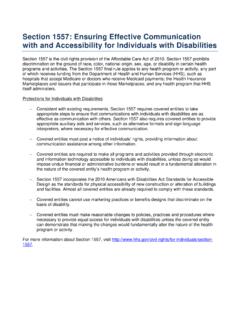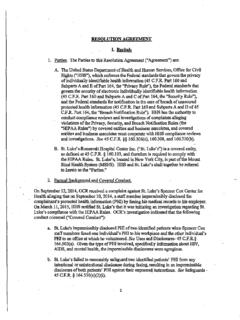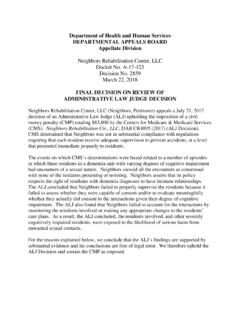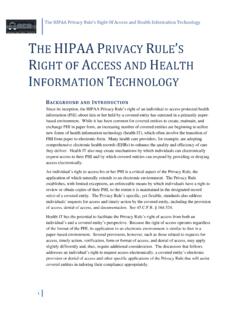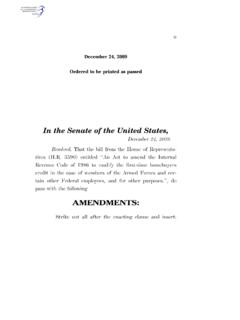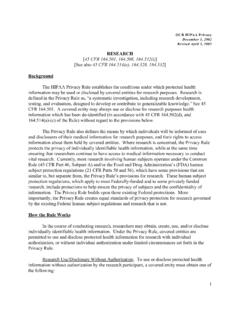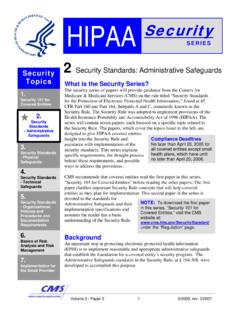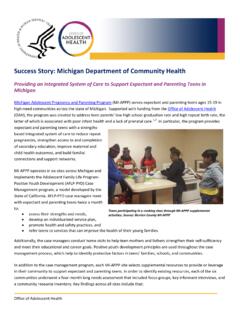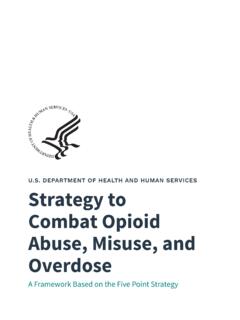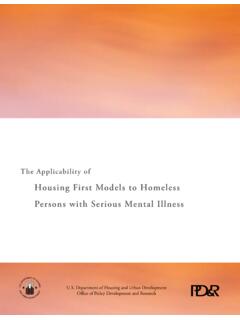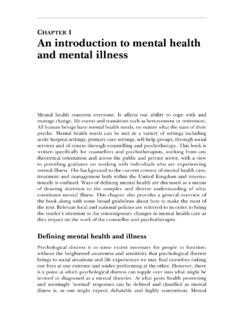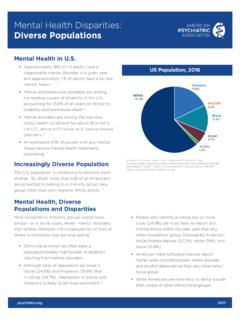Transcription of When Your Child, Teenager, or Adult Son or Daughter has a ...
1 When Your Chil d, T eenager, or Adult Son or Daughter has a mental illness or S ubstance U se Disorder, Including Opioid Addiction: What Pare nts N eed to K now about HIPAA If you are the parent of a child who is affec ted by a mental health condition or substance u se disorder , you want to be informed so you can help your child and keep them safe. As children develop from childhood thr ough adol escence and into adulth ood, both your rights and their rights over their health information change. HIPAA balances protect ing privacy, assuring safety, respecting pr of essio nal judgment, and including family, frie nds, and caregi vers in your child s treatment or care coordination, as appro priate to the situation.
2 Most cases, you are your minor child s personal re presentative, and can exerc ise all of your child sHIPAA rights, including the right to a ccess their complete medical record1 and to authorize or direct thedis closure of their health information to third parti es o f your choosing. A health c are provider may askyou to show proof of your status as a health c are decision-maker for your child. A pr ovid er can decidenot to treat you as a personal re presentative if, for exampl e, they have concerns that doing so might putyour child s safety at risk. There are some additional exceptions that may prevent you from being yourchil d s personal representative or from accessing their medi ca l record, including:a)Your child independently consented to a health care service, no other consent is required by law,and your child has not requested t hat you be treated as hi s or her personal re presentative;b)Your state allows minor s to obtain a health c are service without the consent of a parent, guardian,or other person acting in loco parentis, and your child, a court, o r another authorized person hasconsented to that treatment.
3 Orc)You voluntarily agreed t hat your child s information woul d be kept confidential from generally follows sta te law about parents authority over their minor children s , where state law gi ves your minor child the ability to consent to their own treatment and yourchil d has consented, HIPAA does not gi ve you the right to a ccess information about that treatment. I nother words, if your child is able to consent to treatment, he or she also has the ability to exercise hi s orher own rights under HIPAA re garding information about that treatment. You need to know the law inyour state about minors a bility to consent independently to mental health o r substance u se di sordertreatment.
4 For exampl e, in many states, a minor may consent to receive certain types o f treatment but1 Neither you n or your chil d has a right under HIPAA to a ccess notes of psychothera py sessions that are kept separate fr om the medical r ecord. 1 not others, or for limited amounts of time, without informing parents. Here are six things you may want to find out about your state s laws: 1) The age of majority2 (the age at which an individual is considered an Adult ); 2) What types of health care services a minor child can consent to without parental consent3; 3) What types of health care services someone other than a parent can consent to for a minor child ( , a court or another authorized Adult ); 4) Whether your state allows or requires health care providers to give parents access to certain health information about their minor children.
5 5) Whether your state prohibits health care providers from sharing with, or gi ving parents access to, certain information about their minor children; and 6) Who has legal authority to make health care decisions for an emancipated minor or Adult child who is unable to make health care decisions, if the chi ld has not identifi ed a personal representative in writing. 3. Once your son or Daughter attains the age of majority based on your state s law, they are considered adults and capable of exercising all of the health privacy rights under HIPAA, unless they lack decision making capacity. Even if you think your Adult son or Daughter lacks maturity, if they are legal adults, they get to make their own health privacy decisions.
6 An Adult son or Daughter who has attained the age of majority has the right to control the privacy of their health information, including making decisi ons about who can receive health information about them whi ch was created when they were minor children. 4. HIPAA helps you stay connected with your Adult son or Daughter for whom you are caring by permitting health pr ofessionals to contact you with information related to them that is necessary and relevant to your involvement with their health care or payment for care. If your Adult son or Daughter becomes disoriented, delir ious, or unaware of their surroundings due to, for example, opioid abuse or a mental health crisis, and arrives at a hospital emergency room for treatment, the doctors, nurses, and social workers may notify you of their location and general condition.
7 First , t he staff will determine whet her your child agrees to share thi s information with you, or if you are the patient s personal representative. If your child is not able to make decisions (for example, if he/she is unconscious, sedated, severely intoxicated, or disoriented), t hen the doctors, nurses, and social workers may contact you without your child s permission when a health professional determines that doing so is in your son or Daughter s best interests. The health professionals may share the information that is needed for notification (such as your child s location and general condition) or that is directly related to your involvement in their care.
8 2 In most states the age of majority is 18. Even when under the age of majorit y, a chil d may be consid ere d an Adult ( emancipated ) if they: are marrie d, have a chil d, have join ed the military, or have a court order declarin g them to be emancipated. 3 For example , in many states a minor may consent to re ceive health care servic es related to substance use dis order treatment or outpatie nt counseling, or under certain circumstances. 2 5. If your Adult son or Daughter has the capacity to make decisi ons, doctors need their permission to share their information with you in order to help coordinate mental health or substance use di sorder treatment, including treatment for opioid abuse.
9 Your Adult son or Daughter s doctor, however, c an infer that permissi on if you are involved in their health care or payment for that care, and they have not objected. Additionally, if they are incapacitated or are unavailable to gi ve conse nt because of some emergency situation, HIPAA allows health and mental health providers to make decisi ons about sharing medi cal information with family, fri ends, and caregivers based on the pr oviders pr ofessional judgment about what is best for the patient, factoring in their prior expressed wish es, if any. For example, if a patient who is addicted to opioids misses important medical appointments without any explanation, a pr imary health care provider at a general practice may believe that there is an emergency related to the opi oid addiction and under the circumst ances, may use professi onal judgment to determine that it is in the patient s best interests to reach out to emergency contacts, such as parents or family, and inform them of the si tuation.
10 It can be helpful to establis h your self with your son or Daughter s providers as a helper or caregi ver involved in their care, before an emergency occurs, so the pr oviders know not onl y who to notify in an emergency si tuation, but also who to call about their care. In cases involving significant impairment to your son or Daughter s functioning, you may need to gain legal recognition as the guardian or obtain a medical power of attorney to establish your status as their personal representative under HIPAA. 6. Anyt ime there is a thr eat of serious and imminent harm to your son or Daughter s health or safety (or to others, including you), HIPAA allows their health and mental health providers to share information with you, if you are in a posi tion to prevent or lessen the threat.
